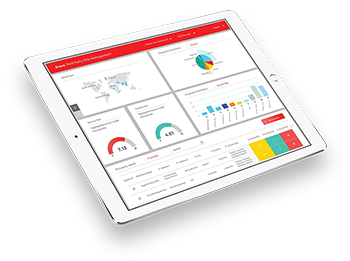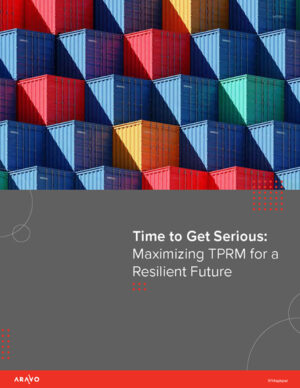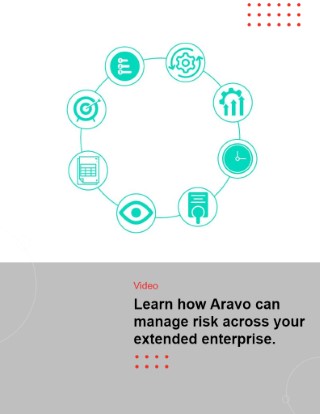- Products
- Products
- Third-Party Risk Management
A third-party management solution to match your program maturity - ABAC Compliance
Combat third-party bribery and corruption risk and comply with international regulations - Environmental, Social & Governance (ESG)
Hold your suppliers to a standard of integrity that reflects your organization’s ESG policies including German Supply Chain Due Diligence Act (LkSG) - Financial Services Risk Assessment
Conduct a comprehensive Financial Services Risk Assessment directly aligned to OCC guidance - Information Security
Protect digital assets by assessing risks from vendors that access your data and/or networks - Data Privacy & GDPR
Ensure vendors are compliant with data privacy regulations and standards, including the CCPA, GDPR and more - Performance Management
Understand, monitor, and manage the performance standards of your third-party suppliers - Risk Intelligence Connectors
Augment Aravo assessments, continuous monitoring, and other due diligence with specialized data providers - Supply Chain Resilience
Prevent, defend, respond, and recover from hazards that put continuity of supply at risk - Capabilities
Pre-configured, best practice solutions that are aligned to customers’ maturity
- Third-Party Risk Management
- Third-Party Information Security Risk Management
Ensure your third parties align to your information security data, privacy, and network security requirements
- Products
- Industry
- Industries
Supporting successful programs across virtually every sector, we understand your business- Financial Services Industry
A third-party management platform that understands regulatory and compliance requirements - Insurance
Third-Party Risk Management and Compliance for the Insurance Industry - Pharma
Third-Party Risk Management and Compliance Solutions for the Pharmaceutical and Life Sciences Industry - High Tech
Third Party Risk Management and Compliance Solutions for the High Tech Industry - Consumer Goods
Third-Party Risk Management Solutions for the CPG Industry - Manufacturing
Third-Party Risk Management and Compliance Requirements for Manufacturing Companies
- Financial Services Industry
- Featured Resource
Learn more about Aravo and how we can help organizations like yours
- Industries
- Resources
- Resources
- Customer Tools / Aravo Academy
The Aravo Academy will help get you up and running with Aravo’s technology. - Strategic Alignment Framework™
An adaptive framework aligning your TPRM goals, plan, and delivery program for your organization. - Blog
Aravo’s blog for expert third-party risk and compliance content - TPRM Solution Voyage
Explore how to choose the right TPRM software for your business - TPRM Maturity Calculator
How mature is your third-party risk management program? Calculate your score - Events and Webinars
Explore Aravo’s events and webinars to get the latest in TPRM and compliance trends from leading experts. - Glossary
The ABCs of TPRM. Here you will find business terms risk professionals use on a daily basis - Guidance and Regulations
An overview of the vast range of regulations and guidance that encompass TPRM
- Customer Tools / Aravo Academy
- Featured Resource
- Resources
- About Us
- About Aravo
Find out more about Aravo, our purpose, and why leading brands trust our technology solutions- Expertise
Market leaders for 20 years, our services professionals have the expertise to work as an extension of your team - Leadership
Our management team. Commited to supporting “Better Business”, delivering the best experience for our customers - Partners
Learn more about our partner ecosystem - Press Releases
Get the latest information on Aravo, including company and product updates - Careers
Explore career opportunities globally and learn more about Aravo culture
- Expertise
- Aravo for Third-Party Risk Management
Learn how Aravo can Manage Risk Across Your Extended Enterprise
- About Aravo
- Request Demo
- Contact
Main menu
Products
Aravo Ecosystem
Main menu
Industry




